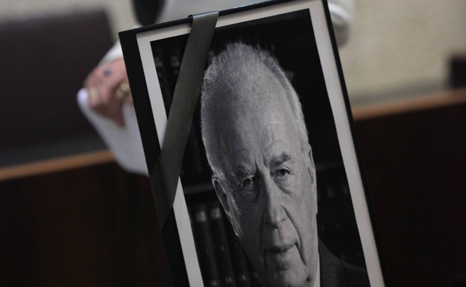Only As a Democracy Will We Win
IDI President Yohanan Plesner says that even after 20 years, the assassination of former Prime Minister Yitzhak Rabin remains the Israeli democracy's breaking point. He calls on all peoples and their leaders to develop a joint democratic vision.

We are in the midst of a spree of terror attacks. Our social media networks are wild with incitement and hatred, which is reaching unprecedented levels. Vile murderers are taking to the streets inspired by this rhetoric.
We will overcome this wave of terror. We will win because our security establishment is superb and because the citizens of Israel are determined and courageous. Let's us not be mistaken: We will defeat our enemies also because of our democratic values – even more so, because of our democratic values.
It is more vital now than ever that we engage in meaningful dialogue, examine our differences, and look toward a future of peaceful co-existence – Jews and Arabs and Jews of various religious values and political positions with each other.
Next month marks 20 years since the assassination of former Prime Minister Yitzhak Rabin. To this day, that murder remains the Israeli democracy's breaking point. It symbolizes the tragic failure of our democratic system to resolve differences in the political sphere and for the state to decide its future via political agreements. Twenty years later, 42 percent of the public fears another political assassination could readily occur (Democracy Index 2015). Israeli society is a divided society; sectarian discourse is intensifying, the conflicts between us remain deep, and the likelihood of the implementation of a joint civil vision is small if existent.
Nonetheless, Israeli democracy was not buried on the night of Rabin's murder. Twenty years later, a large majority of the Israeli public (86%) opposes using guns and ammunition in order to prevent decision makers from implementing their policies. This opposition to violence can and should be used as a part of the foundation for building a joint democratic vision in a society that is currently divided.
Developing a joint democratic vision should be the central challenge we tackle today; the need for one vision is a lesson that must be learned and acted upon. To do this will require a long and arduous process of re-drawing the broken lines of Israeli society. We must pick away at our painful scabs (inequality between Jews and Arabs, between those on the center and on the periphery), testing the level of tension between those with religious and halachic outlooks, for example, and those with nationalistic and statesmen-like outlooks on issues relating to the state's necessary democratic decisions. These could include issues such as control over the Palestinians and the structure of our socioeconomic institutions.
In the last several years, we have continuously witnessed concessions being made on democratic discourse. We have seen a lack of tolerance toward those who are different, expressions of hatred and actions of violence. On the night of Rabin's murder, it was a lack of internalization of democratic values that allowed for such a heinous act to take place. This was especially true on the part of the right-wing extremist public at the time. Unfortunately, this lacking in democratic values has spread to some of our civil servants. Today, we are dealing with a wave of anti-democratic legislation that is intended to harm those who are different and silence or hide those with conflicting opinions.
The best long-term solution for eradicating hatred, incitement and racism, and for internalizing democratic values, is to 1) recognize the depth of those different than us and 2) to provide a civil education about the nature and values of democracy.
On the first issue, we are talking about total recognition, about co-existence, and not about random meetings or using brooms for an hour or two to sweep arguments under the carpet.
Regarding No. 2, providing a civil education about the nature and values of democracy: Educational institutions must foster democratic values in their students. When there is intolerance, hate and violence could be directed at any person or movement: woman, ultra-Orthodox, Arab, secular, religious-Zionist, Sephardi, Ashkenazi, Ethiopian, Russian, foreign worker, asylum seeker, homosexual, tycoon, political leader, and the list goes on. Tolerance is fundamental for the success and strength of democracy. Dehumanizing or delegitimizing the other, in the words of political theorist Johanna "Hannah" Arendt, is what lays the groundwork for acts of violence and what leads to situations where we ignore the basic pillars of morality.
The Rabin assassination was a pivotal event in Israeli society. Immediately after the murder, the discourse was hijacked by false attempts at unity, which paralyzed the true dialogue about our conflicts and the tensions, rather than enabling us to deal with them courageously.
Rabin's murder, just like the wave of events we are experiencing now, reveals how fragile Israeli democracy is. We cannot accept such blows. We require a stable democracy in which the variant voices of Israeli society will be integrated together – one with the other and not against each other.
We require a thriving democracy so that truth – and the human ethics upon which truth is based – will beget support from the free world (especially the United States) for Israel and its security needs. We are obligated to elect a government that will run our society as a true democracy … only as a democracy, will we win.
Yohanan Plesner is president of the Israel Democracy Institute.
